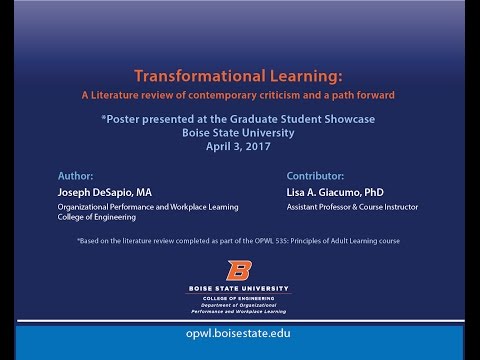
JOSEPH DESAPIO: Yeah, so first time for me doing this, so kind of interesting But if you want me to go ahead and get started, really, I just have a minute or two kind of introduction that I can offer
And then I'd be happy to answer any questions that you might have, if there's anything about my poster that seems intriguing So transformational learning is an adult learning theory And it's a really fascinating one It basically seeks to explore how adults make shifts in their perspective of how they either view themselves, or others, or the world around them And unlike many adult learning theories, at least in general, transformational learning doesn't just understand learning as something that's behavioral or cognitive, but also convectional, and psychological, and sociological, and emotional
And it's a very fascinating theory You can kind of understand transformational learning in the workplace as what happens when a really bad manager– perhaps, he or she is cold, and distant, and self-serving– becomes a really good manager, one who is warm, and invitational, and others-focused What's going on there when that shift takes place? That could be transformational learning In society, you can kind of understand transformational learning as what happens when, perhaps, someone with racist perspectives becomes one who is not a racist So it's this idea of core transformation in worldview and perspective
And perhaps, the only thing that matches the fascination that some have had with transformational learning is the criticism that others have had with the theory And so what I did was a literature review So what I wanted to do was kind of survey where the academic thought was right now around transformational learning– the past 10 years or so of critical literature And I wanted to see if I can identify any trends in that literature of what's exactly being said about it What are some most common critiques? What are the gaps that are being identified? I wanted to try to draw some implications of those criticisms
And then I wanted to try to outline a very brief path forward, maybe how we could move the dialogue in a positive direction to continue to the theory So my poster, I think it outlines– pretty typical– my purpose, method, conclusions, implications And in the center there, you see, those are the four trends that I identified in all the literature that I was surveying So the first one is alternative conceptions That's basically, practitioners have taken the initial kind of tone of transformational learning, offered by a guy named Jack Mezirow in the '70s
And there's been a lot of alternative conceptions, kind of baseline, staying with Mezirow's general thought, but then taking it sometimes in very, very different directions The second trend would be pondering cause And that's really getting at this question of, what is it that practitioners ought to be targeting to see transformational learning take place? So with behaviorism, you're targeting the motor domains and behaviors With certain cognitive theories of learning, you're targeting cognitive abilities and things like that So what is it that we should be targeting to try to see transformational learning take place? The third trend was this use of what I'm calling identity language
And there's a lot of different terms that you insert there to use in place of identity But it's basically some practitioners trying to get at, what is it that we ought to be targeting to see transformational learning take place? So what is it about that bad manager that needs to be targeted to catalyze some form of learning that is so transformative that he goes from being a bad manager to the good manager? And there's starting to be some consensus around this idea of identity language And then the fourth trend– which is somewhat, perhaps, of an absence of a trend– is that most of the literature in the last 10 years or so, particularly the critical literature– it's very theoretical So it lacks a lot of practical implications How do we do this? How do we close the gap between theory and practice? What is it that we can implement in a repeatable way, and therefore, then measure to see if we can successfully implement some sort of strategy of transformational learning? So that's kind of a nutshell of what I did
And yeah, if you have any questions, I'd be happy to try to answer them SPEAKER 1: So I have a question How do you measure the different trends? If you see a pattern or you see that maybe they're transforming using that trend, is there a way to measure it? JOSEPH DESAPIO: To measure the actual trend? SPEAKER 1: Yeah, like them trending that way or whatever? Or you just notice that that's what they've done? JOSEPH DESAPIO: Yeah, so this was being a literature review, really, what I did was– there was a certain set of search terms and a searching methodology that I used to try to identify papers that would fit into the category of critical literature, trying to get at practical applications of transformational learning So once I tried to identify a larger group of papers that I wanted to look through, it really was a process of just reading, and highlighting, and trying to analyze, and synthesize, and put some things together in spreadsheets So the trends, perhaps, are aren't quantifiable
There's not a lot of data that you're looking at in that sense of quantifiable trends But more so, I was trying to act as a barometer for where the dialogue is at So there is a certain measure of subjectivity that I'm sure plays into that But in general, I'd be confident to say that, based on the pieces that I've surveyed, these are the trends that are prevalent there SPEAKER 1: OK
So you can us a little bit more about the implications? JOSEPH DESAPIO: Yeah So going through all this, and identifying these trends, there was a pretty interesting thing that I noticed And that's, really, trends 2 and 3, so pondering cause– what causes this– and then the use of identity language So there's a journal called The Journal of Transformative Education And upon its inception, the journal called for academically provocative solutions to transformational learning, so things that you wouldn't typically think of, perhaps, that are the most easily quantifiable
Because you're really dealing with these kind of big ideas that impact society and the workplace, not just meeting numbers And that's really the core of why transformational learning has received such criticism Because when you're talking about ideas like that, it really is hard to quantify them How do you quantify a good manager? You often, in the workplace, hear these things like, well, maybe he's not cut out– or she's not cut out– to be people manager It's a subjective perspective of how you interact and relate to people
And that's why, like I said, transformational learning is so interesting in that it really leans into psychology, and sociology about how people interact with people, and about how people view themselves and view the world around them Whereas adult learning, largely, is very scientific in how we look at catalyzing learning in the workplace and in various other institutions and societies So my implications, to your question more specifically– that's kind of context– is that the recent critical literature, it really seems like we're onto something But I think to develop it further, we have to be willing and able to try to explore some of these provocative, non-rational, non-typical domains of human emotion, human conviction, human belief systems And the real work that would be done is to figure out, how can we analyze those things? How can we, to a degree, quantify those things to develop a strategy for implementing transformational learning, and then also to be able to assess its success? And so my implications are kind of summing that up, and saying, this is what we need to be getting at to dive deeper into this
And then the path forward section is kind of a very rudimentary hypothesis about some things that we could explore a little bit further by way of developing a strategy that could be implemented to catalyze transformational learning, and therefore assess its success SPEAKER 1: Thank you Do you have any questions? Is there another question that's in the chat? JOSEPH DESAPIO: Oh, I do see a chat here Joe, can you share your poster online? I'm sure that's possible I don't know how
I'm sorry That was Steve I could certainly email it to you And I'd be happy to do that STEVE: Yeah, I'd love to see it
I guess, if I think about transformational learning, two things strike me One is that it's one of those things where probably all of us have experienced some form of it It's also one of those things that's very hard to categorize, plan for, or measure Personally, what happened to me is I went from being a competent instructional designer to a person who was a senior instructional designer who managed other people's work That was transformational
Because suddenly, it's not just instructional design anymore It's all this management stuff about quality, and schedule, and budget, and building process, and capacity That was a major change in all the variables that you mentioned I guess if I want to use transformational learning effectively to help people make these kinds of career changes, what kinds of suggestions could you offer for doing that in a workplace setting? JOSEPH DESAPIO: Yeah And so I tried to think hard about good examples to use
Because that's often the best way to communicate I think one of those examples really is relating to that manager And so perhaps we fall into a broader category of leadership development When you're talking about that potentially bad manager who's cold a bit self-serving, what are the suggestions that I would make based on what I'm seeing here and these calls for non-practical, kind of identity language solutions? That's where I call out in that path forward section on my poster– which, obviously, you don't have before you But there's three things there
And it's a struggle, a story, and something about connectedness And so struggle– Mezirow, his theory, one of the first things that he called out was this thing called a disorienting dilemma And that was you do face some sort of just shift, or mix-ups, a wrench gets thrown into your gears And so the experience of struggle, or the observation of struggle within others, I think, can really be used I don't think it's something that we think of using typically
But I think that that experience or observation of that struggle can really be used So in the example of that manager, he's probably struggling to be effective Maybe his performance ratings, the folks he manages perhaps aren't giving him great reviews And that's also probably causing the job of those he manages to be a bit of a struggle So trying to kind of unpack that a little bit, and expose that, I think is one piece
And then the next piece I would call story, which is really compelling narratives Because we're trying to target identity, which is wrapped up in psychology, sociology, emotions, convictions Spreadsheets typically don't do that for people, at least for a lot of people But compelling narratives do And I often think of– you see a lot of these documentaries
And certain documentaries, I think, are actually wonderful examples of transformational learning, whether they be things like Blackfish, exposing how animals are treated, or Food, Inc, different things like that That's really an attempt at creating a compelling narrative that is targeting a person's perspectives and worldview, and seeing in such a way that their hope is to create a shift in perspective And so I think those are examples And then connectedness kind of has its roots in communities of practice in the workplace And like I said, so that last bit is really– based on everything that the research that I did in trying to understand the gaps that were being identified, and the criticisms that were being offered, this is really my very rudimentary hypothesis about, what are some ways that could be studied a little bit more to figure out how to make a strategy that could be implemented in the workplace or other institutions of society that can be then assessed as to whether or not they're successful in creating transformation? So yeah, I hope that answers your question
STEVE: What kinds of things would you put in the environment to support this? Learning is one of those things that happens at the level of the individual What kinds of environmental supports might you put in place, in terms of data, or instruments, or incentives in support of this? JOSEPH DESAPIO: Yeah, and so answering that question is probably beyond the scope of what I initially did So I could rattle of, perhaps, some ideas off the top of my head But I probably wouldn't be able to back them up with a lot of deep analysis Because I didn't really go there
My focus is really to try to understand where the dialogue was at, and kind of synthesize that, and have a really good understanding of that, and then being able to articulate it, along with some suggestions, or thoughts, or kind of questions that perhaps might lead to some aha moments So I wouldn't want to pretend to offer some really great answers to that one Because I didn't really go there in much depth I do think I am one minute past my time Time flies when you're– SPEAKER 1: Yeah, it does
It goes by fast JOSEPH DESAPIO: I would want to also call out the acknowledgement– Lisa is on the call here And she's provided a lot of help to me I bounce ideas back and forth off of her This was initially a project that I worked on in 531, a class that she was on
And so yeah, thank you so much for all of your help and support through that, Lisa Really appreciate it LISA A GUACUMO: Well, you did a wonderful job, Joe STEVE: Joe rocks
Yay! LISA A GUACUMO: Joe does rock [LAUGHING] JOSEPH DESAPIO: All right, well, I don't want to go into anyone else's time I don't know how exactly this meeting is set up But I think it's for me to sign off
So I just [INAUDIBLE] SPEAKER 1: Great job Thanks, everybody Thank you LISA A
GUACUMO: Well done, Joe JOSEPH DESAPIO: Thank you Have a good one







